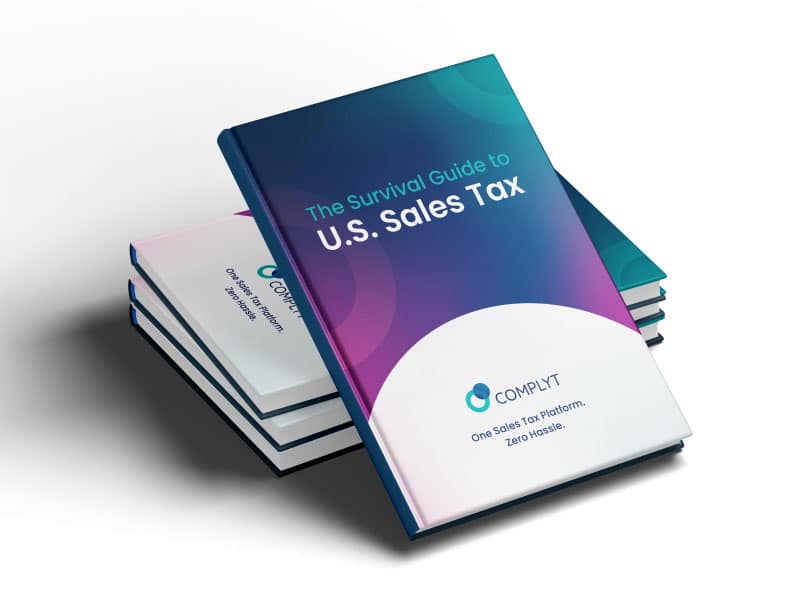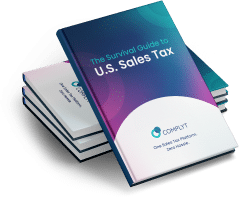What is the sales tax rate in Texas?
The state sales tax rate in Texas is currently 6.25%. However, these rates increase to 8.25% in almost every Texas jurisdiction as cities, counties, special districts, and transit authorities can each impose up to a 2% sales tax.
As a business operating in Texas, it’s important to know the specific sales tax rate for the areas you operate in. The tax rate can vary depending on the specific location of your business, or where you’re selling and delivering your products or services.
Texas Sales Tax Compliance: When should your business collect Sales Tax?
As with other states, your business is required to collect sales tax in Texas if you have established a “nexus” there.
A nexus, or sales tax connection, is created if your business has a physical presence, such as a store, office, or warehouse, or even a staff member, such as a salesperson, agent, or representative operating in the state. Additionally, an economic nexus can be created if you exceed $500,000 in sales.
And once you have a nexus in Texas, you have to apply for a Sales Tax Texas Permit and start getting serious about compliance.
Determining Your Texas Physical Sales Tax Nexus
Having a physical presence in Texas creates a Physical Sales Tax Nexus, and thus, a responsibility to collect and remit sales tax.
But a physical presence is a far more intricate affair than you may think.
Sales Tax Physical Nexus checklist for Texas
Here are just a few of the key situations that can create a physical sales tax nexus in Texas:
- Owning or leasing property (office, warehouse, etc.) in Texas
- Employing individuals who reside in Texas
- Storing inventory in a warehouse in Texas
- Having a third-party affiliate in Texas
- Drop-shipping from a third-party provider based in Texas
Understanding Texas Economic Nexus Thresholds and Transactions
An Economic Nexus in Texas is established as soon as your business has exceeded $500,000in revenue gained from sales of tangible personal property or taxable services in the preceding 12 calendar months.
Identifying Services Taxable in Texas
In Texas, a number of services are subject to sales tax, including:
- Amusement services
- Cable television services and bundled cable services
- Personal services, such as laundry, cleaning, and car washing services
- Repair, remodeling, and restoration of tangible personal property
But this is far from an exhaustive list, and other services fall within the ambit of taxable services without businesses even realizing.
Texas Sales Tax on Products: How to Calculate What Your Business Should be Charging
To calculate the sales tax to charge on products, businesses should add the state rate (6.25%) to any local rates applicable in the location where the sale is made. For example, if you’re operating in a city that charges a 1.5% local tax, the total sales tax you should charge is 7.75%.
Is clothing subject to sales tax in Texas?
Yes, clothing is subject to sales tax in Texas. Texas clothing tax is made up of the state sales tax rate of 6.25% plus the additional local use taxes depending on where a business sells or stores their products. So Texas clothing tax can be as high as 8.25% in certain instances.
Unpacking Texas Online Sales Tax: Are SaaS and Digital Services Taxable?
In brief, yes. Texas is one of the states that has taken a firm stand on Software as a Service (SaaS), deeming it taxable. In terms of Texas online sales tax regulations, digital products, which include items such as downloaded music, movies, books, apps, and other similar digital goods, are also taxable.
The Texas Comptroller has stated that access to software hosted on a remote server via the internet, where customers can input, retrieve, and manage data, falls under the category of taxable data processing services.
Should my Business be charging Sales Tax for SaaS in Texas?
Yes, if you’re selling SaaS to customers in Texas, you’ll need to collect sales tax, given the state’s legislation treating SaaS as a taxable service. And as tax laws are updated to address the evolution of the digital business landscape, SaaS providers need to be especially aware of new compliance regulations, as illustrated by Texas SaaS sales tax.
How can a business apply for a sales tax permit in Texas?
To collect sales tax in Texas, businesses need to apply for a Texas Sales Tax Permit. The application process is free and applications can be completed online through the Texas Online Tax Registration Application page on the Texas Comptroller website.
Filing On Time: Guidelines for Collecting Sales Tax in Texas
Once you have your Texas Sales Tax Permit, you are required to collect sales tax on all taxable sales and remit these to the Texas Comptroller’s office. Which also means you need to start syncing your tax office’s calendar with the Texas Comptroller’s one.
Here are the dates you need to mark on your calendar if you’ve triggered a sales tax nexus in Texas:
Texas tax return due dates explained
In Texas, sales tax returns are typically due on the 20th of the month following the reporting period. However, the frequency of filing returns depends on the amount of sales tax collected.
What is the required frequency for sales tax returns in Texas?
For businesses collecting less than $500 per month in sales tax, returns should be filed quarterly. If you collect between $500 and $20,000 per month, returns should be filed monthly. If your business collects more than $20,000 per month, returns should be filed on a semi-monthly basis.

